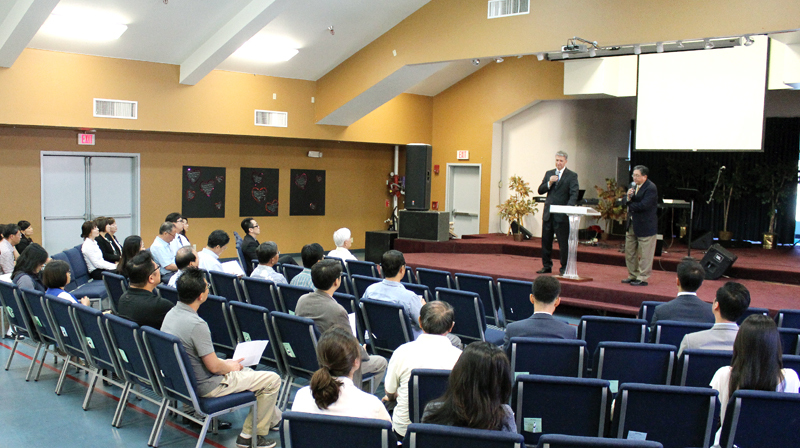
The Pacific Justice Institute (PJI), a non-profit legal organization that specializes in defending religious freedom, held a seminar at LA Full Gospel Church on Monday to discuss the ramifications that the recent Supreme Court ruling on gay marriage will have on churches and Christians.
Brad Dacus, president and founder of PJI, discussed the potential impacts that will be felt by Christian colleges, churches, families, and businesses. He also discussed the ways in which church bylaws should be amended for greater legal protection in case of litigation.
"Religious freedom has never been more threatened in U.S. history," he claimed, and said that in all settings -- schools, families, businesses, and churches -- there is an uncertainty as to how legal issues will pan out.

Pastors and lay members attended a recent seminar hosted by the Pacific Justice Institute on the legal implications of the recent Supreme Court ruling legalizing same-sex marriages nation-wide.
Dacus says that the first line of defense are the Christian colleges that could potentially lose their tax exempt status, for being considered as discriminatory against LGBT students, similar to the way Bob Jones University lost its tax-exempt status for banning interracial marriages in 1983. Churches could also lose their tax-exempt status, but that would likely not happen until Christian institutions' tax-exempt statuses are taken away first, "for political reasons," Dacus added.
Families may also be impacted by the ruling as well, Dacus said, in that a parent's failure to embrace the child's sexuality can be considered "negligence,' resulting in the parent's loss of custody over the child.
"If CPS (Child Protective Services) social workers try to take your children, please, please don't hesitate to contact us," Dacus said. "We will protect your children from being taken."
The ruling will also affect what is taught in public schools, he continued. Teachers who favor same-sex marriages are now "empowered to promote same-sex marriage," and the social studies curriculum in public schools will likely include lessons on the contributions made by LGBT individuals. Dacus encouraged parents who are concerned about this to sign opt-out forms which would allow their children to be excused from sitting in during such lesson plans.
Dacus also discussed the ways businesses have been impacted. On the one hand, he mentioned the cases of a flower shop, a bakery, and a photographer refusing service to same-sex weddings, and that all of these businesses have lost their cases.
On the other hand, there are also Christian businesses that have won lawsuits, including a Christian T-shirt business in Kentucky that refused to print gay pride festival shirts that was vindicated by the court. The court ruled that the law protects the company's decision not to print shirts with speech that contradicts the company's beliefs, under the First Amendment.
Hobby Lobby is another Christian business that won a lawsuit. It challenged the contraceptive coverage requirement under the Affordable Care Act, claiming that the requirement went against their Christian principles. Dacus explained some of the major factors that led to Hobby Lobby's victory was that it was a closely held business, and that they had protection under the federal Religious Freedom Restoration Act (RFRA). Though a similar result could apply to other closely held businesses, Dacus said, results could also differ depending on the state by state statutes on religious freedom.

Brad Dacus, the president of the Pacific Justice Institute, was featured as the main speaker at the seminar on Monday.
"We don't know how [future cases will] to pan out," Dacus said. "That's why we have to be cautious."
A similar uncertainty applies for churches and pastors, Dacus said. However, Dacus urged church leaders to adjust their policies and bylaws. He says that changes in the church's bylaws "will, for the time being at least, protect your churches."
In the revised version of their bylaws, churches should explicitly state their doctrine on marriage and sexuality. Bylaws should also include policies regarding the use of facilities and even church membership. PJI provides an outline on its website (pacificjustice.org) on how churches should revise their bylaws. Such revisions in church policies and bylaws will offer a stronger basis for protection under the First Amendment and a stronger likelihood for a church or pastor to win a lawsuit, in the case that a church and/or pastor face litigation and claims of discrimination.
PJI, which was founded in 1997, consists of hundreds of volunteer affiliate attorneys across the nation, and offers pro-bono services for churches, pastors, and lay members facing legal issues regarding their religious freedom. The organization's headquarter is in Sacramento, CA, with four other office locations in Santa Ana, Oakland, Riverside, and San Diego.


















